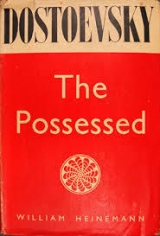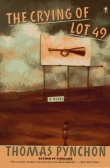
Текст книги "The Possessed"
Автор книги: Федор Достоевский
сообщить о нарушении
Текущая страница: 40 (всего у книги 49 страниц)
The Possessed, by Fyodor Dostoyevsky
Chapter IV. The Last Resolution
THAT MORNING MANY people saw Pyotr Stepanovitch. All who saw him remembered that he was in a particularly excited state. At two o'clock he went to see Gaganov, who had arrived from the country only the day before, and whose house was full of visitors hotly discussing the events of the previous day. Pyotr Stepanovitch talked more than anyone and made them listen to him. He was always considered among us as a “chatterbox of a student with a screw loose,” but now he talked of Yulia Mihailovna, and in the general excitement the theme was an enthralling one. As one who had recently been her intimate and confidential friend, he disclosed many new and unexpected details concerning her; incidentally (and of course unguardedly) he repeated some of her own remarks about persons known to all in the town, and thereby piqued their vanity. He dropped it all in a vague and rambling way, like a man free from guile driven by his sense of honour to the painful necessity of clearing up a perfect mountain of misunderstandings, and so simple-hearted that he hardly knew where to begin and where to leave off. He let slip in a rather unguarded way, too, that Yulia Mihailovna knew the whole secret of Stavrogin and that she had been at the bottom of the whole intrigue. She had taken him in too, for he, Pyotr Stepanovitch, had also been in love with this unhappy Liza, yet he had been so hoodwinked that he had almosttaken her to Stavrogin himself in the carriage. “Yes, yes, it's all very well for you to laugh, gentlemen, but if only I'd known, if I'd known how it would end!” he concluded. To various excited inquiries about Stavrogin he bluntly replied that in his opinion the catastrophe to the Lebyadkins was a pure coincidence, and that it was all Lebyadkin's own fault for displaying his money. He explained this particularly well. One of his listeners observed that it was no good his “pretending”; that he had eaten and drunk and almost slept at Yulia Mihailovna's, yet now he was the first to blacken her character, and that this was by no means such a fine thing to do as he supposed. But Pyotr Stepanovitch immediately defended himself.
“I ate and drank there not because I had no money, and it's not my fault that I was invited there. Allow me to judge for myself how far I need to be grateful for that.”
The general impression was in his favour. “He may be rather absurd, and of course he is a nonsensical fellow, yet still he is not responsible for Yulia Mihailovna's foolishness. On the contrary, it appears that he tried to stop her.”
About two o'clock the news suddenly came that Stavrogin, about whom there was so much talk, had suddenly left for Petersburg by the midday train. This interested people immensely; many of them frowned. Pyotr Stepanovitch was so much struck that I was told he turned quite pale and cried out strangely, “Why, how could they have let him go?” He hurried away from Gaganov's forthwith, yet he was seen in two or three other houses.
Towards dusk he succeeded in getting in to see Yulia Mihailovna though he had the greatest pains to do so, as she had absolutely refused to see him. I heard of this from the lady herself only three weeks afterwards, just before her departure for Petersburg. She gave me no details, but observed with a shudder that “he had on that occasion astounded her beyond all belief.” I imagine that all he did was to terrify her by threatening to charge her with being an accomplice if she “said anything.” The necessity for this intimidation arose from his plans at the moment, of which she, of course, knew nothing; and only later, five days afterwards, she guessed why he had been so doubtful of her reticence and so afraid of a new outburst of indignation on her part.
Between seven and eight o'clock, when it was dark, all the five members of the quintet met together at Ensign Erkel's lodgings in a little crooked house at the end of the town. The meeting had been fixed by Pyotr Stepanovitch himself, but he was unpardonably late, and the members waited over an hour for him. This Ensign Erkel was that young officer who had sat the whole evening at Virginsky's with a pencil in his hand and a notebook before him. He had not long been in the town; he lodged alone with two old women, sisters, in a secluded by-street and was shortly to leave the town; a meeting at his house was less likely to attract notice than anywhere. This strange boy was distinguished by extreme taciturnity: he was capable of sitting for a dozen evenings in succession in noisy company, with the most extraordinary conversation going on around him, without uttering a word, though he listened with extreme attention, watching the speakers with his childlike eyes. His face was very pretty and even had a certain look of cleverness. He did not belong to the quintet; it was supposed that he had some special job of a purely practical character. It is known now that he had nothing of the sort and probably did not understand his position himself. It was simply that he was filled with hero-worship for Pyotr Stepanovitch, whom he had only lately met. If he had met a monster of iniquity who had incited him to found a band of brigands on the pretext of some romantic and socialistic object, and as a test had bidden him rob and murder the first peasant he met, he would certainly have obeyed and done it. He had an invalid mother to whom he sent half of his scanty pay – and how she must have kissed that poor little flaxen head, how she must have trembled and prayed over it! I go into these details about him because I feel very sorry for him.
“Our fellows” were excited. The events of the previous night had made a great impression on them, and I fancy they were in a panic. The simple disorderliness in which they had so zealously and systematically taken part had ended in a way they had not expected. The fire in the night, the murder of the Lebyadkins, the savage brutality of the crowd with Liza, had been a series of surprises which they had not anticipated in their programme. They hotly accused the hand that had guided them of despotism and duplicity. In fact, while they were waiting for Pyotr Stepanovitch they worked each other up to such a point that they resolved again to ask him for a definite explanation, and if he evaded again, as he had done before, to dissolve the quintet and to found instead a new secret society “for the propaganda of ideas” and on their own initiative on the basis of democracy and equality. Liputin, Shigalov, and the authority on the peasantry supported this plan; Lyamshin said nothing, though he looked approving. Virginsky hesitated and wanted to hear Pyotr Stepanovitch first. It was decided to hear Pyotr Stepanovitch, but still he did not come; such casualness added fuel to the flames. Erkel was absolutely silent and did nothing but order the tea, which he brought from his landladies in glasses on a tray, not bringing in the samovar nor allowing the servant to enter.
Pyotr Stepanoviteh did not turn up till half-past eight. With rapid steps he went up to the circular table before the sofa round which the company were seated; he kept his cap in his hand and refused tea. He looked angry, severe, and supercilious. He must have observed at once from their faces that they were “mutinous.”
“Before I open my mouth, you've got something hidden; out with it.”
Liputin began “in the name of all,” and declared in a voice quivering with resentment “that if things were going on like that they might as well blow their brains out.” Oh, they were not at all afraid to blow their brains out, they were quite ready to, in fact, but only to serve the common cause (a general movement of approbation). So he must be more open with them so that they might always know beforehand, “or else what would things be coming to?” (Again a stir and some guttural sounds.) To behave like this was humiliating and dangerous. “We don't say so because we are afraid, but if one acts and the rest are only pawns, then one would blunder and all would be lost.” (Exclamations. “Yes, yes.” General approval.)
“Damn it all, what do you want?”
“What connection is there between the common cause and the petty intrigues of Mr. Stavrogin?” cried Liputin, boiling over. “Suppose he is in some mysterious relation to the centre, if that legendary centre really exists at all, it's no concern of ours. And meantime a murder has been committed, the police have been roused; if they follow the thread they may find what it starts from.”
“If Stavrogin and you are caught, we shall be caught too,” added the authority on the peasantry.
“And to no good purpose for the common cause,” Virginsky concluded despondently.
“What nonsense! The murder is a chance crime; it was committed by Fedka for the sake of robbery.”
“H'm! Strange coincidence, though,” said Liputin, wriggling.
“And if you will have it, it's all through you.”
“Through us?”
“In the first place, you, Liputin, had a share in the intrigue yourself; and the second chief point is, you were ordered to get Lebyadkin away and given money to do it; and what did you do? If you'd got him away nothing would have happened.”
“But wasn't it you yourself who suggested the idea that it would be a good thing to set him on to read his verses?”
“An idea is not a command. The command was to get him away.”
“Command! Rather a queer word. . . . On the contrary,
your orders were to delay sending him off.”
“You made a mistake and showed your foolishness and self-will. The murder was the work of Fedka, and he carried it out alone for the sake of robbery. You heard the gossip and believed it. You were scared. Stavrogin is not such a fool, and the proof of that is he left the town at twelve o'clock after an interview with the vice-governor; if there were anything in it they would not let him go to Petersburg in broad daylight.”
“But we are not making out that Mr. Stavrogin committed the murder himself,” Liputin rejoined spitefully and unceremoniously. “He may have known nothing about it, like me; and you know very well that I knew nothing about it, though I am mixed up in it like mutton in a hash.”
“Whom are you accusing?” said Pyotr Stepanovitch, looking at him darkly.
“Those whose interest it is to burn down towns.”
“You make matters worse by wriggling out of it. However, won't you read this and pass it to the others, simply as a fact of interest?”
He pulled out of his pocket Lebyadkin's anonymous letter to Lembke and handed it to Liputin. The latter read it, was evidently surprised, and passed it thoughtfully to his neighbour; the letter quickly went the round.
“Is that really Lebyadkin's handwriting?” observed Shigalov.
“It is,” answered Liputin and Tolkatchenko (the authority on the peasantry).
“I simply brought it as a fact of interest and because I knew you were so sentimental over Lebyadkin,” repeated Pyotr Stepanovitch, taking the letter back. “So it turns out, gentlemen, that a stray Fedka relieves us quite by chance of a dangerous man. That's what chance does sometimes! It's instructive, isn't it?”
The members exchanged rapid glances.
“And now, gentlemen, it's my turn to ask questions,” said Pyotr Stepanovitch, assuming an air of dignity. “Let me know what business you had to set fire to the town without permission.”
“What's this! We, we set fire to the town? That is laying the blame on others!” they exclaimed.
“I quite understand that you carried the game too far,” Pyotr Stepanovitch persisted stubbornly, “but it's not a matter of petty scandals with Yulia Mihailovna. I've brought you here gentlemen, to explain to you the greatness of the danger you have so stupidly incurred, which is a menace to much besides yourselves.”
“Excuse me, we, on the contrary, were intending just now to point out to you the greatness of the despotism and unfairness you have shown in taking such a serious and also strange step without consulting the members,” Virginsky, who had been hitherto silent, protested, almost with indignation.
“And so you deny it? But I maintain that you set fire to the town, you and none but you. Gentlemen, don't tell lies! I have good evidence. By your rashness you exposed the common cause to danger. You are only one knot in an endless network of knots – and your duty is blind obedience to the centre. Yet three men of you incited the Shpigulin men to set fire to the town without the least instruction to do so, and the fire has taken place.”
“What three? What three of us?”
“The day before yesterday, at three o'clock in the night, you, Tolkatchenko, were inciting Fomka Zavyalov at the 'Forget-me-not.' “
“Upon my word!” cried the latter, jumping up, “I scarcely said a word to him, and what I did say was without intention, simply because he had been flogged that morning. And I dropped it at once; I saw he was too drunk. If you had not referred to it I should not have thought of it again. A word could not set the place on fire.”
“You are like a man who should be surprised that a tiny spark could blow a whole powder magazine into the air.”
“I spoke in a whisper in his ear, in a corner; how could you have heard of it?”
Tolkatchenko reflected suddenly.
“I was sitting there under the table. Don't disturb yourselves, gentlemen; I know every step you take. You smile sarcastically, Mr. Liputin? But I know, for instance, that you pinched your wife black and blue at midnight, three days ago, in your bedroom as you were going to bed.”
Liputin's mouth fell open and he turned pale. (It was afterwards found out that he knew of this exploit of Liputin's from Agafya, Liputin's servant, whom he had paid from the beginning to spy on him; this only came out later.)
“May I state a fact?” said Shigalov, getting up.
“State it.”
Shigalov sat down and pulled himself together.
“So far as Iunderstand – and it's impossible not to understand it – you yourself at first and a second time later, drew with great eloquence, but too theoretically, a picture of Russia covered with an endless network of knots. Each of these centres of activity, proselytising and ramifying endlessly, aims by systematic denunciation to injure the prestige of local authority, to reduce the villages to confusion, to spread cynicism and scandals, together with complete disbelief in everything and an eagerness for something better, and finally, by means of fires, as a pre-eminently national method, to reduce the country at a given moment, if need be, to desperation. Are those your words which I tried to remember accurately? Is that the programme you gave us as the authorised representative of the central committee, which is to this day utterly unknown to us and almost like a myth?”
“It's correct, only you are very tedious.”
“Every one has a right to express himself in his own way. Giving us to understand that the separate knots of the general network already covering Russia number by now several hundred, and propounding the theory that if every one does his work successfully, all Russia at a given moment, at a signal . . .”
“Ah, damn it all, I have enough to do without you!” cried Pyotr Stepanovitch, twisting in his chair.
“Very well, I'll cut it short and I'll end simply by asking if we've seen the disorderly scenes, we've seen the discontent of the people, we've seen and taken part in the downfall of local administration, and finally, we've seen with our own eyes the town on fire? What do you find amiss? Isn't that your programme? What can you blame us for?”
“Acting on your own initiative!” Pyotr Stepanovitch cried furiously. “While I am here you ought not to have dared to act without my permission. Enough. We are on the eve of betrayal, and perhaps to-morrow or to-night you'll be seized. So there. I have authentic information.”
At this all were agape with astonishment.
“You will be arrested not only as the instigators of the fire, but as a quintet. The traitor knows the whole secret of the network. So you see what a mess you've made of it!”
“Stavrogin, no doubt,” cried Liputin.
“What . . . why Stavrogin?” Pyotr Stepanovitch seemed suddenly taken aback. “Hang it all,” he cried, pulling himself together at once, “it's Shatov! I believe you all know now that Shatov in his time was one of the society. Imust tell you that, watching him through persons he does not suspect, Ifound, out to my amazement that he knows all about the organisation of the network and . . . everything, in fact. To save himself from being charged with having formerly belonged, he will give information against all. He has been hesitating up till now and I have spared him. Your fire has decided him: he is shaken and will hesitate no longer. To-morrow we shall be arrested as incendiaries and political offenders.”
“Is it true? How does Shatov know?” The excitement was indescribable.
“It's all perfectly true. I have no right to reveal the source from which I learnt it or how I discovered it, but I tell you what I can do for you meanwhile: through one person I can act on Shatov so that without his suspecting it he will put oft giving information, but not more than for twenty-four hours.” All were silent.
“We really must send him to the devil!” Tolkatchenko was the first to exclaim.
“It ought to have– been done long ago,” Lyamshin put in malignantly, striking the table with his fist.
“But how is it to be done?” muttered Liputin. Pyotr Stepanovitch at once took up the question and unfolded his plan. The plan was the following day at nightfall to draw Shatov away to a secluded spot to hand over the secret printing press .which had been in his keeping and was buried there, and there “to settle things.” He went into various essential details which we will omit here, and explained minutely Shatov's present ambiguous attitude to the central society, of which the reader knows already.
“That's all very well,” Liputin observed irresolutely, “but since it will be another adventure ... of the same sort ... it will make too great a sensation.”
“No doubt,” assented Pyotr Stepanovitch, “but I've provided against that. We have the means of averting suspicion completely.”
And with the same minuteness he told them about Kirillov, of his intention to shoot himself, and of his promise to wait for a signal from them and to leave a letter behind him taking on himself anything they dictated to him (all of which the reader knows already).
“His determination to take his own life – a philosophic, or as I should call it, insane decision – has become known there” Pyotr Stepanovitch went on to explain. “ Therenot a thread, not a grain of dust is overlooked; everything is turned to the service of the cause. Foreseeing how useful it might be and satisfying themselves that his intention was quite serious, they had offered him the means to come to Russia (he was set for some reason on dying in Russia), gave him a commission which he promised to carry out (and he had done so), and had, moreover, bound him by a promise, as you already know, to commit suicide only when he was told to. He promised everything. You must note that he belongs to the organisation on a particular footing and is anxious to be of service; more than that I can't tell you. To-morrow, after Shatov's affair,I'll dictate a note to him saying that he is responsible for his death. That will seem very plausible: they were friends and travelled together to America, there they quarrelled; and it will all be explained in the letter . . . and . . . and perhaps, if it seems feasible, we might dictate something more to Kirillov – something about the manifestoes, for instance, and even perhaps about the fire. But I'll think about that. You needn't worry yourselves, he has no prejudices; he'll sign anything.”
There were expressions of doubt. It sounded a fantastic story. But they had all heard more or less about Kirillov; Liputin more than all.
“He may change his mind and not want to,” said Shigalov; “he is a madman anyway, so he is not much to build upon.”
“Don't be uneasy, gentlemen, he will want to,” Pyotr Stepanovitch snapped out. “I am obliged by our agreement to give him warning the day before, so it must be to-day. I invite Liputin to go with me at once to see him and make certain, and he will tell you, gentlemen, when he comes back – to-day if need be – whether what I say is true. However,” he broke off suddenly with intense exasperation, as though he suddenly felt he was doing people like them too much honour by wasting time in persuading them, “however, do as you please. If you don't decide to do it, the union is broken up – but solely through your insubordination and treachery. In that case we are all independent from this moment. But under those circumstances, besides the unpleasantness of Shatov's betrayal and its consequences, you will have brought upon yourselves another little unpleasantness of which you were definitely warned when the union was formed. As far as I am concerned, I am not much afraid of you, gentlemen. . . . Don't imagine that I am so involved with you. . . . But that's no matter.”
“Yes, we decide to do it,” Liputin pronounced.
“There's no other way out of it,” muttered Tolkatchenko, “and if only Liputin confirms about Kirillov, then . . .
“I am against it; with all my soul and strength I protest against such a murderous decision,” said Virginsky, standing up.
“But?” asked Pyotr Stepanovitch. . . .
“ Butwhat?”
“You said but . . .and I am waiting.”
“I don't think I did say but ... Ionly meant to say that if you decide to do it, then . . .”
“Then?”
Virginsky did not answer.
“I think that one is at liberty to neglect danger to one's own life,” said Erkel, suddenly opening his mouth, “but if it may injure the cause, then I consider one ought not to dare to neglect danger to one's life. . . .”
He broke off in confusion, blushing. Absorbed as they all were in their own ideas, they all looked at him in amazement – it was such a surprise that he too could speak.
“I am for the cause,” Virginsky pronounced suddenly.
Every one got up. It was decided to communicate once more and make final arrangements at midday on the morrow, though without meeting. The place where the printing press was hidden was announced and each was assigned his part and his duty. Liputin and Pyotr Stepanovitch promptly set off together to Kirillov.
II
All our fellows believed that Shatov was going to betray them; but they also believed that Pyotr Stepanovitch was playing with them like pawns. And yet they knew, too, that in any case they would all meet on the spot next day and that Shatov's fate – was sealed. They suddenly felt like flies caught in a web by a huge spider; they were furious, but they were trembling with terror.
Pyotr Stepanovitch, of course, had treated them badly; it might all have gone off far more harmoniously and easilyif he had taken the trouble to embellish the facts ever so little. Instead of putting the facts in a decorous light, as an exploit worthy of ancient Rome or something of the sort, he simply appealed to their animal fears and laid stress on the danger to their own skins, which was simply insulting; of course there was a struggle for existence in everything and there was no other principle in nature, they all knew that, but still . . .
But Pyotr Stepanovitch had no time to trot out the Romans; he was completely thrown out of his reckoning. Stavrogin's flight had astounded and crushed him. It was a lie when he said that Stavrogin had seen the vice-governor; what worried Pyotr Stepanovitch was that Stavrogin had gone off without seeing anyone, even his mother – and it was certainly strange that he had been allowed to leave without hindrance. (The authorities were called to account for it afterwards.) Pyotr Stepanovitch had been making inquiries all day, but so far had found out nothing, and he had never been so upset. And how could he, how could he give up Stavrogin all at once like this! That was why he could not be very tender with the quintet. Besides, they tied his hands: he had already decided to gallop after Stavrogin at once; and meanwhile he was detained by Shatov; he had to cement the quintet together once for all, in case of emergency. “Pity to waste them, they might be of use.” That, I imagine, was his way of reasoning.
As for Shatov, Pyotr Stepanovitch was firmly convinced that he would betray them. All that he had told the others about it was a lie: he had never seen the document nor heard of it, but he thought it as certain as that twice two makes four. It seemed to him that what had happened – the death of Liza, the death of Marya Timofyevna – would be too much for Shatov, and that he would make up his mind at once. Who knows? perhaps he had grounds for supposing it. It is known, too, that he hated Shatov personally; there had at some time been a quarrel between them, and Pyotr Stepanovitch never forgave an offence. I am convinced, indeed, that this was his leading motive.
We have narrow brick pavements in our town, and in some streets only raised wooden planks instead of a pavement. Pyotr Stepanovitch walked in the middle of the pavement, taking up the whole of it, utterly regardless of Liputin, who had no room to walk beside him and so had to hurry a step behind or run in the muddy road if he wanted to speak to him. Pyotr Stepanovitch suddenly remembered how he had lately splashed through the mud to keep pace with Stavrogin, who had walked, as he was doing now, taking up the whole pavement. He recalled the whole scene, and rage choked him.
But Liputin, too, was choking with resentment. Pyotr Stepanovitch might treat the others as he liked, but him! Why, he knewmore than all the rest, was in closer touch with the work and taking more intimate part in it than anyone, and hitherto his services had been continual, though indirect. Oh, he knew that even now Pyotr Stepanovitch might ruin him if it came to the worst.But he had long hated Pyotr Stepanovitch, and not because he was a danger but because of his overbearing manner. Now, when he had to make up his mind to such a deed, he raged inwardly more than all the rest put together. Alas! he knew that next day “like a slave” he would be the first on the spot and would bring the others, and if he could somehow have murdered Pyotr Stepanovitch before the morrow, without ruining himself, of course, he would certainly have murdered him.
Absorbed in his sensations, he trudged dejectedly after his tormentor, who seemed to have forgotten his existence, though he gave him a rude and careless shove with his elbow now and then. Suddenly Pyotr Stepanovitch halted in one of the principal thoroughfares and went into a restaurant.
“What are you doing?” cried Liputin, boiling over. “This is a restaurant.”
“I want a beefsteak.”
“Upon my word! It is always full of people.”
“What if it is?”
“But ... we shall be late. It's ten o'clock already.”
“You can't be too late to go there.”
“But I shall be late! They are expecting me back.”
“Well, let them; but it would be stupid of you to go to them. With all your bobbery I've had no dinner. And the later you go to Kirillov's the more sure you are to find him.”
Pyotr Stepanovitch went to a room apart. Liputin sat in an easy chair on one side, angry and resentful, and watched him eating. Half an hour and more passed. Pyotr Stepanovitch did not hurry himself; he ate with relish, rang the bell, asked for a different kind of mustard, then for beer, without saying a word to Liputin. He was pondering deeply. He was capable of doing two things at once – eating with relish and pondering deeply. Liputin loathed him so intensely at last that he could not tear himself away. It was like a nervous obsession. He counted every morsel of beefsteak that Pyotr Stepanovitch put into his mouth; he loathed him for the way he opened it, for the way he chewed, for the way he smacked his lips over the fat morsels, he loathed the steak itself. At last things began to swim before his eyes; he began to feel slightly giddy; he felt hot and cold run down his spine by turns.
“You are doing nothing; read that,” said Pyotr Stepanovitch suddenly, throwing him a sheet of paper. Liputin went nearer to the candle. The paper was closely covered with bad handwriting, with corrections in every line. By the time he had mastered it Pyotr Stepanovitch had paid his bill and was ready to go. When they were on the pavement Liputin handed him back the paper.
“Keep it; I'll tell you afterwards. . . . What do you say to it, though?”
Liputin shuddered all over.
“In my opinion . . . such a manifesto ... is nothing but a ridiculous absurdity.”
His anger broke out; he felt as though he were being caught up and carried along.
“If we decide to distribute such manifestoes,” he said, quivering all over, “we'll make ourselves, contemptible by our stupidity and incompetence.”
“H'm! I think differently,” said Pyotr Stepanovitch, walking on resolutely.
“So do I; surely it isn't your work?”
“That's not your business.”
“I think too that doggerel, 'A Noble Personality,' is the most utter trash possible, and it couldn't have been written by Herzen.”
“You are talking nonsense; it's a good poem.”
“I am surprised, too, for instance,” said Liputin, still dashing along with desperate leaps, “that it is suggested that we should act so as to bring everything to the ground. It's natural in Europe to wish to destroy everything because there's a proletariat there, but we are only amateurs here and in my opinion are only showing off.”
“I thought you were a Fourierist.”
“Fourier says something quite different, quite different.”
“I know it's nonsense.”
“No, Fourier isn't nonsense. . . . Excuse me, I can't believe that there will be a rising in May.”
Liputin positively unbuttoned his coat, he was so hot.
“Well, that's enough; but now, that I mayn't forget it,” said Pyotr Stepanovitch, passing with extraordinary coolness to another subject, “you will have to print this manifesto with your own hands. We're going to dig up Shatov's printing press, and you will take it to-morrow. As quickly as possible you must print as many copies as you can, and then distribute them all the winter. The means will be provided. You must do as many copies as possible, for you'll be asked for them from other places.”








